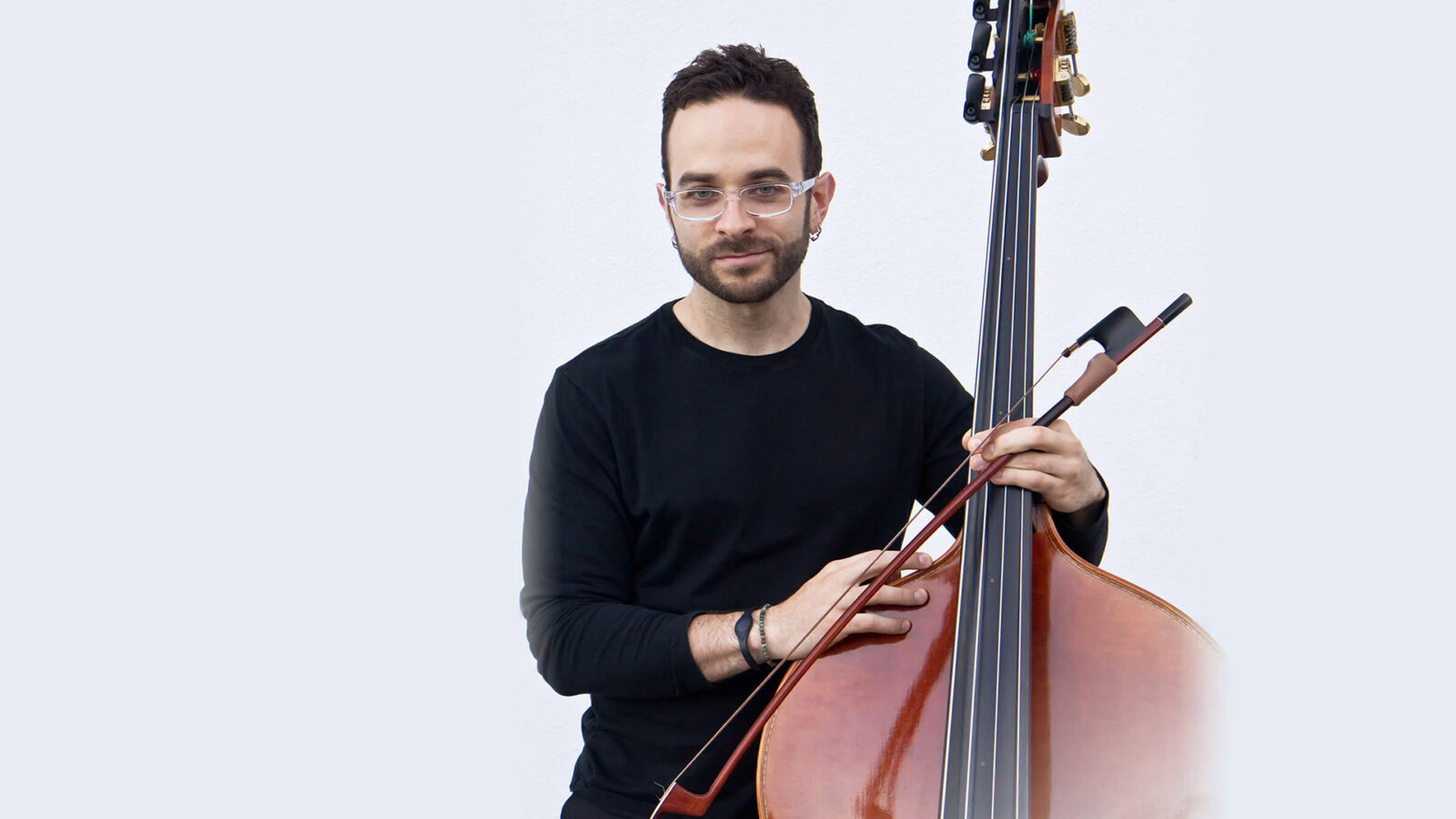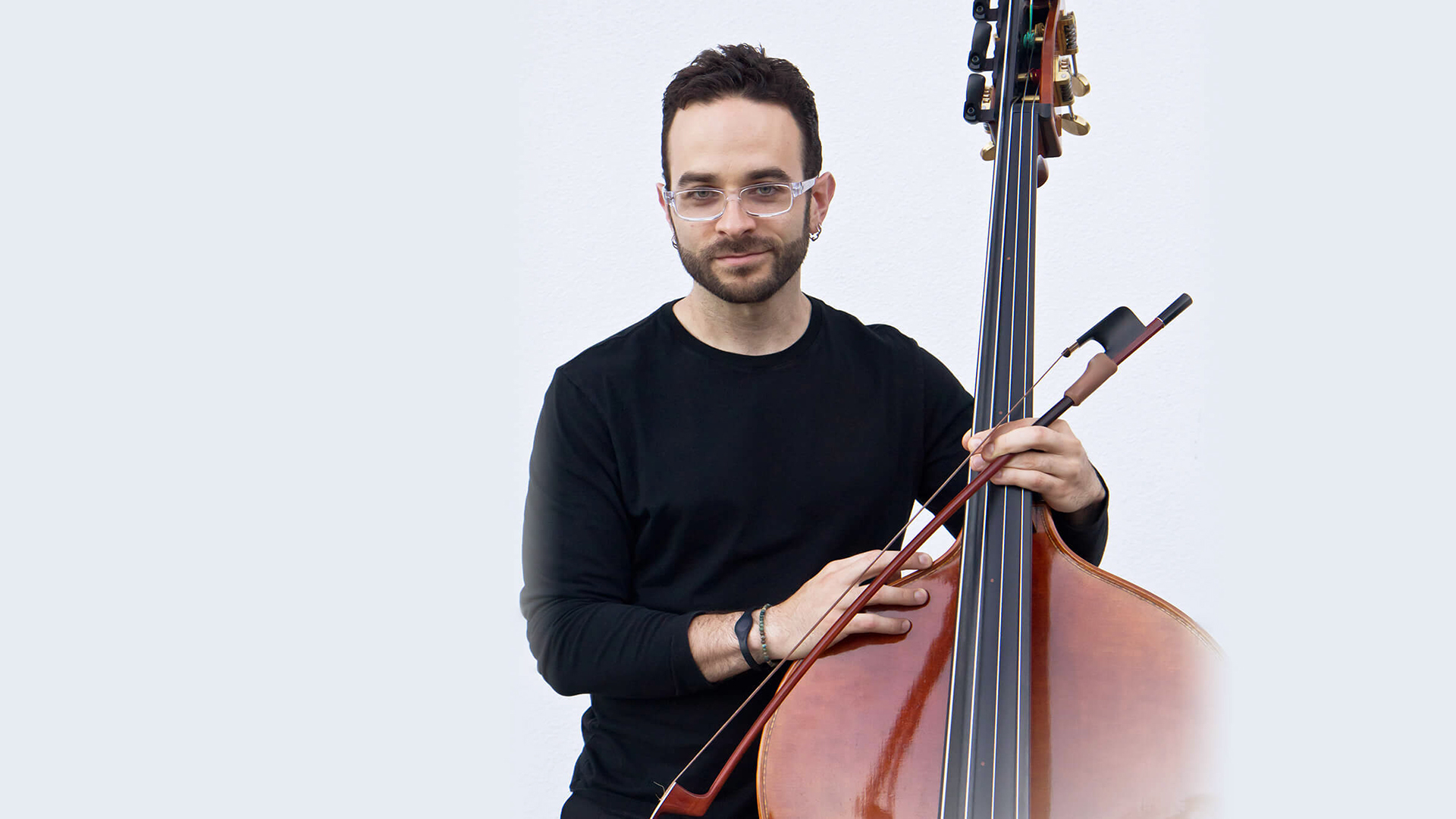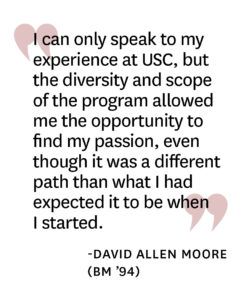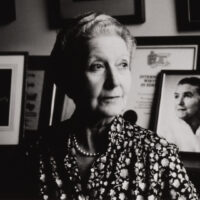
Focus on Strengths, Identify Weaknesses
By David Allen Moore

David Allen Moore, professor of double bass at USC Thornton and a member of the LA Phil, writes of his journey to find his passion in music.
I believe many of us have been sold a bill of goods in arts education and education in general. The common refrain is to “focus on your weakness” in order to improve and be successful. The world would be a profoundly different place if the mantra was “focus on your strengths and identify your weakness(es) to properly contextualize them in a way that furthers your personal, professional, and artistic goals.” Not nearly as concise or sexy (and really difficult to put on a T-shirt), but it can change how we frame the entire educational experience.
First and foremost, education should be about exposure and not enforced generalization so that you can become the cog in someone else’s machine. How can you even know where your strengths or passions lie if you have not been exposed to a range of academic subjects, musical genres, philosophical concepts, etc.? I would not have the career I have today had it not been for a series of exposures that happened along my journey.

I would not be a bassist if not for my father, Randolph Moore. Dad was (and still is) an avid fan of traditional blues that began as an exploration of the roots of rock artists (e.g. The Rolling Stones) who drew their inspiration from the same source. In order to be more a part of the music, he bought a used Gibson-copy SG electric bass and taught himself to play along with his favorite records from various books purchased at a local music store. I can remember many weekends filled with sounds of Willie Dixon, Lightnin’ Hopkins, Muddy Waters, and Howlin’ Wolf coming from the living room stereo system with my Dad playing along with the bass lines. Soon I was drawn to the instrument lying seductively on the couch (the instrument, not me). I was hooked at the age of 13.
I attended the Berklee College of Music’s Summer program in 1987 as an electric bass player. I was 100% convinced that I would eventually end up there for college and that this was a “dry run” to get a sense of the school and a head start on my higher education experience. While at Berklee I had a chance to meet and play with some amazing musicians, but I was exposed to a blind spot I didn’t know I had. The most serious players wanted to play with an upright bass player in the rhythm section, and I missed out on a lot of opportunities.
I decided at that point that I needed to attend a school that I could get into as an electric bass player that also offered the advantages of a traditional conservatory setting in order to grow as a double bassist. USC Thornton was one of the only schools at the time that had high level offerings in both classical and jazz, and with faculty like Paul Ellison, John Clayton, and Dennis Trembly I figured I couldn’t go wrong. I metaphorically sneaked in the back door via good grades and electric bass.
At the time, the goal was to study classical technique as a means to improve my jazz playing. In the summer of 1992, I was fortunate to get accepted to the academy that used to be part of the Grand Teton Music Festival. After an amazing summer playing in the orchestra, I felt a deep and distant pang of loss as if this would be the last time that I would ever play this amazing music at such a high level. I decided at that point that I had to pursue a career as a classical double bassist. For me (I feel like I need to underline, highlight, and put stars around “for me”), I knew that I wanted to go all-in on one path and see where it would take me rather than becoming adequate-to-competent at a range of styles.
Perceived weakness takes many forms, and identifying and addressing its source can be an intense process of self-examination and discovery. The all-important ingredients are passion and desire. If there is no sense of value to improvement the lack of motivation will subvert any good intentions. An area of weakness may be due to lack of exposure or familiarity. This was certainly true in my case.
Without my serendipitous series of experiences and the support of family and mentors I might have never discovered where my true strengths and passions lay. I can only speak to my experience at USC, but the diversity and scope of the program allowed me the opportunity to find my passion, even though it was a different path than what I had expected it to be when I started.
It breaks my heart when I hear young players bemoan “conservatory culture” and “The Grind.” The path of an artist requires an environment that supports the unique voice of every individual. If that voice lies in a more established or traditional path then the road or the environment to support it may be more clear, but it is our responsibility as mentors and educators to nurture our students’ passion for their art, not some pre-determined, cookie-cutter, soul-crushing attempt to create “marketable skills.” I have had students leverage their double bass skills to follow passions in record production, electronic music, and arts management, and the environment at USC helped expose them to these possibilities.
“The Grind” is a slightly different discussion. No high level is attained without consistent, dedicated hard work. That should not be confused as the same thing as “grinding,” which I see as feeling burdened by the external pressure to live up to expectations and to work hard at something that is not ultimately aligned with your voice. The best career advice that I ever received can be boiled down to three words by Joseph Campbell: “Follow your bliss.”
An earlier version of this blog first appeared on Moore’s website, fractalbassist.com.


